Old news: the origins of originality
by Mika Provata-Carlone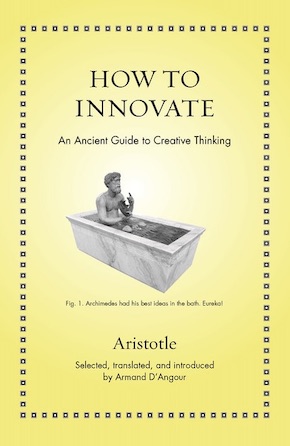
“Filled with insights that will inspire visionaries and creators of all kinds.” Adrienne Mayor, author of Gods and Robots
The ancient Greeks are old news to us, or so we appear to be claiming. For some, at this very specific moment in time, they are not just antiquated, or relegated to the shades of oblivion, they are practically obsolescent, an existential black hole, even a socio-political and ethical-historical anathema. The question of the Greeks and the Romans (but not of the Egyptians, the Assyrians or the Persians? Of the Scythians, the peoples of ancient China, South America, Arabia, or India?) necessarily implicates the very perception of history and the past in the 21st century. It is a cavernously vast issue, a sort of postmodern labyrinth, inhabited on both left and right by dogmatising minotaurs known and unknown, where any reckless and intrepid Theseus may venture at his peril, with little chance of a tender-hearted Ariadne and her thread coming to his rescue…
Ours is a time of no attachments, no strings, no threads… No pasts, no ancestors or even ghosts, to loosely quote a recent conversation between Barak Obama and Bruce Springsteen. We see no moral difficulty in translating, transmogrifying and altering the Greeks and the Romans, and with them what we lump together as Western Civilisation, a monochromic blur with no hues or variations, traumas, tribulations or distinctions, in order to suit and serve what may well be our own, tortuously skewed capacity of both sight and vision, our own lust to be “the measure of all things”, to quote a Greek who went by the name of Protagoras. Another Greek, by the name of Socrates, would question this supremacism of the human and its rhetoric of super-spin. According to Socrates, the very dignity of the human condition depends on our honesty and self-analysis, the clarity of our syllogisms, the translucence of our ethical pronouncements and motivations. Also on a certain ethos of humility. Wittingly or not, we all owe a rooster to Apollo at some point or other in our lives…
We often choose to forget that the Greeks (and yes, even the Romans) questioned more than they asserted; problematised more than they imposed monolithic canons or prescriptive manifestos; related and connected more than they alienated or othered; engaged in self-examination, in the conscientious discipline of understanding, more than they did in propounding partisan doctrines or absolutist articles of faith. By conceptually monetising, objectifying and ideologically commodifying them, we feel triumphant and superior, cleansed of both ancestral guilt, but also of the responsibility to account for our own, contemporary versions of the fundamental questions we must answer at any point in space or time: who, why, how and what for, whither and whence, now, ever or never…
Armand D’Angour certainly possesses this ability for indomitable yet delicate equipoise, for initiating and engaging in inexhaustible, timeless conversations, as well as evincing a rare skill for connections.”
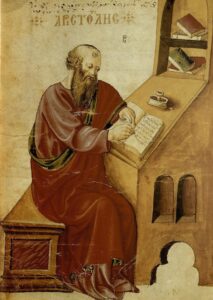
Aristotle at his writing desk, miniature in a 1457 manuscript (artist unknown). Austrian National Library/Wikimedia Commons
Yet there is still resistance to the trend of demonising the past (a particular past only, it often seems). In its best and most constructive form, this resistance seeks to actually look at the Greeks (and the Romans, und so weiter) in their own terms, rather than at ourselves through the Greeks (etc.). Instead of making them subservient to our needs and desires, as a particular American professor of Classics would rather have us do, this kind of resilience to the gales and breezes of our current intellectual and social climate allows them the dignity of their own presence and absence, voice and Nachleben. And oddly enough, the very staunchness of this resistance derives from its capacity for quiet fortitude, for admiration and enchantment, for dialectical encounters rather than totalising confrontations. It is free from the terrible (and terribly narcissistic) anxiety of influence, from compulsive and (not infrequently) falsifying projections, yearning instead for the exchange and sharing of human experience.
Armand D’Angour certainly possesses this ability for indomitable yet delicate equipoise, for initiating and engaging in inexhaustible, timeless conversations, as well as evincing a rare skill for connections. His enthralment with classical civilisation, its living practice and tradition, combines with a rather extraordinary talent for discovering perfectly new things just where everyone has been staring at so intently for more than two and a half thousand years. For being able to relate anew a story that has been told innumerable times.
His new book, How to Innovate: An Ancient Guide to Creative Thinking, is unapologetic in its claim that the value of the ancients should not be stripped of its worth for the sake of the Emperor’s new clothes and mind. It is also groundbreaking in the most radical sense, i.e., contingent upon critical continuity, and a synthesising rather than a reductionist modus cogitandi. This continuity is historical, for he believes in a human venture of understanding, in a diachronic dialectics of knowledge and intelligence; it is personal, for this present volume is both a companion piece and a direct offspring of his doctoral thesis, published in 2011 as The Greeks and the New: Novelty in Ancient Greek Imagination and Experience; it is also disciplinary and theoretical, in that he argues for the centrality of the past, its inalienable value, its agency and currency, as regards our understanding of the present and the future. To quote properly this time from that Obama-Springsteen conversation, “The trick is you have to turn your ghosts into ancestors. Ghosts haunt you. Ancestors walk alongside you and provide you with comfort and a vision of life that’s going to be your own. [It can take] a long time for that to happen.”
A Greek stands chatting with an Egyptian priest in his temple, or so the story goes. The priest tells the Greek that he and his countrymen are but newborns, their civilisation as recent as a butterfly just out of its cocoon. The implication is that the Greeks emerged when the human world and its constituent civilisations were already venerable and old, past the prospect of either originality or newness. So how could the ancient Greeks hope to innovate? And what did they consider truly creative, original thinking? D’Angour places these questions at the very heart of his search for the Greeks and their own sense of the phenomenal or the miraculous, yet first he has a few clichés and stilted stereotypes to get out of the way. Namely, that the Greeks did not care for what we call progress or the technical, practical application of invention, since, as it is often (rather vaguely and indiscriminately) asserted, they had no lack of labour resources (including slaves). D’Angour, however, does not consider this a logical inevitability: “One reason for this [misconception] appeared to be the general consensus among classical scholars and historians that the Greeks were averse to innovation and shunned the new […] What was needed, I felt, to redress the emphasis was a thorough reappraisal of the Greeks’ responses to the new, beginning with an attempt to distinguish those spheres in which novelty was rejected from those in which it was welcomed.” What he will also examine are the specific “conditions, fertile for innovation” that must have existed.
D’Angour’s Greeks are clearly Aristotle’s Hellenes rather than a motley crowd, and they seem to be very much both vibrant and alive.”
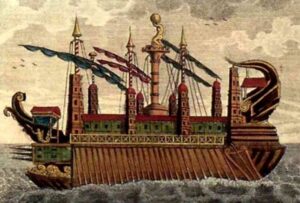
The Syracusia, a large cargo and passenger ship of Ancient Greece, depicted c. 1798. Wikimedia Commons
These he finds across all areas of social, cultural or scientific praxis, and he is able to identify particular, distinct “mechanisms [that] underlie [the Greeks’] innovative practices: mechanisms such as the borrowing and adaptation of external ideas, the cross-fertilisation of disparate disciplines, and the posing of disruptive critiques to the ideas and practices of their predecessors”. The Greeks themselves did not systematise these “principles of innovation” – if they were averse to anything, it was Gestalt formalism, opting rather for the art of ideal approximation – such as the more-or-lessness of their tapered Ionic columns. In this new slim volume (which should be read alongside the lengthier, yet equally beguiling The Greeks and the New) D’Angour offers a selection of writings where these principles form part of the Greeks’ own ongoing dialectics on the nature of being and doing. He will thus create an organic template for a thinker’s vademecum of ancient innovation, in the sense of that untranslatable l’imaginaire. He gives us the Greeks as they were, featuring the original texts as indelible and irrefutable presence and as evidence, as well as new English versions that make the Greek words travel across time and sociohistorical conscience. To check the veracity of his arguments, the originality of his thoughts, readers will have to go back to his origins, i.e., the Greeks themselves and their writings. They will also travel across the Greek world both in space and time, from Ionia to Magna Grecia, to mainland Greece, to the Nachleben of the Greeks among the Romans. D’Angour’s Greeks are clearly Aristotle’s Hellenes rather than a motley crowd, and they seem to be very much both vibrant and alive.
D’Angour echoes Peter Oleson in his redefinition of Greek attitudes to innovation: for Oleson, Greco-Roman “theories of social evolution can easily be compared with 19th-century theories of ‘progress’. […] Chreia [necessity] drove humans to create their technai [arts, technologies], and the mechanai [devices] to assist with them, while observation of nature provided models.” Innovation and techne for the Greeks was the gift of a god, such as Prometheus or Athena, Hephaestus, Apollo or even Ares, as well as being the fruit of human ingenuity, as Sophocles would argue in the famous hymn at the heart of his Antigone. The role of science and technology in human life and society was crucially debated, the argument strong for either side: ancient thinkers would have us believe that “thought and dialectic were preferable to applied research and the arts and crafts,” Oleson continues, yet the archaeological and literary evidence shows the opposite, namely that the Greeks were as fascinated by the praxis as they were by the nous of things. As D’Angour points out, “The Greeks’ legacy of innovation in art and drama, logic and mathematics, medicine and historiography is embodied in surviving artefacts, living traditions and an unparalleled assortment of written texts.”
D’Angour will engage with both those who “feel a pressure to be innovative” and those who “are perplexed about the meaning of innovation and the value of the new.” Admittedly, it is not always an easy equilibrium to maintain. The mathematician Yang-Hui He likes to tell the following story about Michael Faraday: when tasked to come up with a particular, vital, utilitarian discovery, Faraday experienced a total and unsurmountable writer’s block. His mind, it would seem, had gone completely blank, all genius gone. But once the pressure of materialistic and programmatic purposefulness was removed, he was able to change the course of physics. D’Angour’s own paradigm is Archimedes, whose story is much more than the episode of the famous bathtub. He too valued the creative freedom to think and imagine more than the drive to deliver and accomplish…
The thrill regarding the abilities of the human mind was invariably contrasted with the question of hubris, that old-fashioned distinction between ‘one can, but one may not.'”
D’Angour places great emphasis on words and their significance, their pivotal role in establishing our very connection with the world and with existence itself, and in ensuring the balance of our judgement about almost everything that matters. The words he uses in this case are carefully chosen, and the first two serve to highlight our critical distance from the ancients: where we have pressure, they had wonder; where we feel perplexity, they allowed for mystery. The second couplet of operative terms, value and meaning, articulate the ineluctable implication and complicity between past and present: the ongoing dialectics regarding both has determined who we are, who we can be, or wish to be, at each point of our societal becoming, at every level, material or transcendental.
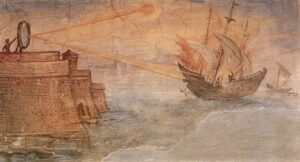
Wall painting showing Archimedes’ mirror being used to burn Roman military ships by Giulio Parigi, 1600. Uffizi Gallery, Florence/Wikimedia Commons
It is on this basis that D’Angour posits the question of what constitutes true “innovation and how is one to think about change.” He proposes five categories of reflection: the first examines “the principles of change”, the second “the conditions of creation”, the third offers a vital and complex debate on the “principle of disruption”, while the fourth will tackle the modus operandi of very nearly everything on the sociohistorical and scientific-cultural compass, namely competition. The fifth, and last, category, is the culmination and synthesis of all: what is the ethical framework of innovation and the new? The moral status of the old?
D’Angour has a clear prism of approach, namely that we should be ready to query what we consider “uses” and what “abuses” of innovation, of the old and the new, the past and the present. As Oleson has also noted, the “moral ambiguity of technical knowledge” – and the question of the limits or limitlessness of human control over the cosmos – was a key concern then, as it is (or ought to be) today. The thrill regarding the abilities of the human mind was invariably contrasted with the question of hubris, that old-fashioned distinction between one can, but one may not. Our own questions surrounding the uses, abuses and limits, real or necessary, of science, technology and AI are not much different, and this is a parallel D’Angour has already argued for in The Greeks and the New: “In today’s world, with its unprecedented technological capabilities and global interconnections, novelty is a constant and inescapable feature of everyday life. The pursuit of the new drives commerce, science, education and the arts. Creativity is commodified, originality is considered the key to success. Novelty is sought out by inventors, extolled by advertisers, devoured by consumers. ‘Innovation’ is the buzzword of modernity. ‘News’ is a term so implicated with rapid and sophisticated communications media that its semantic connection to ‘new’ is often all but forgotten. Words such as newness, news, novelty and innovation, despite their very different connotations, exhibit a family resemblance in that they all in some way converge upon the everyday, if deceptively simple-seeming, notion of ‘the new’. This notion retains the power to arouse a range of responses, negative as well as positive. It evokes pleasure and excitement, anxiety and resignation. Newness entails change, an inescapable aspect of the world and of the human condition.” It also implies, then and more so now, the prospect of subsuming the human to the mechanical, existence to virtuality, freedom and that irreducible l’imaginaire evoked by D’Angour, to algorithmic automation. “In his Critique of Judgement (1790), Kant articulates a distinction between mere ‘novelty’ and ‘exemplary originality’,” he reminds us. The latter for the Greeks should have the inherent potential for visionary wonder (thauma), it should evoke not mere thrill and exhilaration, but the very aaahness of things and the cosmos…
The past, in all its images and shadows, is our own Athenian stage of tragedy and comedy. And we are as much spectators as we are actors, writers and agents, as we are the embodiments of a fate that is, and is not our own.”
Both The Greeks and the New and How to Innovate are not just about the material processes of progress or change. They aim to explore and contemplate, to bring to renewed and reappraised focus a fuller, richer spectrum of “the Greeks’ responses to ‘the new’.” As D’Angour argues, “Novelty in manifold guises – change and metamorphosis, emergence and genesis, strangeness and wonder, difference and plurality – inhabits a key place in the landscape of Greek imagination.” It is clearly an opportunity to encounter the Greeks as they themselves were, in the world they sought to create and inhabit. It is also an invitation (or a challenge?) to look at ourselves today with greater sincerity and lucidity, truly making the best and the most of our vantage point as belated dwarves on the shoulders of perhaps far too many giants. That some of these giants may have also been ogres, of greater or lesser terribleness, is an oft-dismissed crucial point. We have their narratives of hubristic failure to learn from, a comparative distance from which to evaluate their less-than-human paradigms. The past, in all its images and shadows, is our own Athenian stage of tragedy and comedy. And we are as much spectators as we are actors, writers and agents, as we are the embodiments of a fate that is, and is not our own.
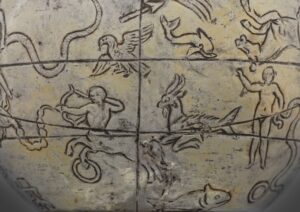
Detail from a silver celestial globe, 300–100 BC. On loan from the Nicolas and Alexis Kugel Collection for the Science Museum exhibition Ancient Greeks: Science and Wisdom © Guillaume Benoit
Being themselves both encumbered and empowered by the past, enthralled with, as well as perhaps awed by the present and the future, the Greeks would originate a new alphabet for literature, science and thought, a new constitution and political science for the world, new ways of encountering history and the other: through curiosity, exchange, amazement and admiration, the recording of stories, the development of myths or parables of reference and reflection, in order to both question and affirm, experiment with the new, allot a communal place to the old. They would envision new ways to engage with time, by tracking its course through dates and calendars, by giving it a beginning and an agency in history. “The growing diversity of human experience was represented in an explosion of new forms and genres of literature,” but also in the understanding of the almostness rather than the perfectionism of things: theirs was the pursuit not of haughty perfection or supremacy, but of the good and the beautiful, which they termed kalokagathia. Their finest, and perhaps wisest achievement was (not quite) a paradox, namely that delicate balance of an imperfect excellence, an aristeia that did not forget either its human duty or dimension.
The Greeks were not afraid to write anew rather than ex nihilo, possessing the wisdom to listen to the echoes of old voices, allowing the traces of old writing to inform new discourses and paradigms. “Experiencing something new involves a capacity for internal change: a change in one’s psyche or perspective, an impulse to see things through fresh eyes.” The ultimate condition for innovation, besides the material and social circumstances and individual genius, is a change in paradigms, a conscious shift in perspective, whether to defamiliarise the familiar in order to better see its distinctive features, or to familiarise the unknown in order to recognise its patterns and connections. This is the true Archimedian story for D’Angour, who shows it to be not mere anecdote, but an entire history waiting to be told, of industry, innovation, state rivalry and societal vision, as well as of a culture of the beautiful, and he unfolds the tale with flourish, and a certain sense of the prodigious.
It is one of D’Angour’s most alluring traits, not just as a historian, but as an eloquent storyteller of things past, to sleuth incessantly and tirelessly. He is insatiably curious about small details, about the whys and hows, about long-forgotten clues and red herrings. In Socrates in Love he set out to unveil the most personal and crucially revealing stages of the philosopher’s life; here he excitedly reveals that Archimedes’ famous bathtub was most likely a very large one, at least by association. In fact, it was the whole of the Mediterranean Sea. Rather than figuring out the authenticity of a precious royal trinket, the sage’s eureka moment, D’Angour argues, had to do with the construction of the ancient world’s super-ships, magnificent metal-clad Leviathans of state power and war, but also of a certain rhythm of being and way of life. D’Angour retrieves the text of Athenaeus and the detailed record it provides, not only of shipbuilding and design, but also of the aesthetics, customs, living gestures of the time. It makes for an engrossing tale, and readers might find themselves lost, exploring libraries and temples, gymnasia and storerooms, on-deck conservatories, galleries, fish tanks and stables, the arrangements and pulse of human lives. Archimedes in his bathtub did not simply discover specific gravity, he invented a way to make entire worlds stay afloat, quite simply perhaps because he was able to dream about them. The condition for that was, in a sense, metaphorical rather than literal analysis, the freedom to play with concepts, ideas, possibilities, rather than pure linearity. Today we like to give metaphoricity a more technocratic garb: we call it a paradigm shift.
Is all change, all disruption, or all newness a goal to be pursued, an agathon, a good thing, in every sense? Aristotle for one ‘leaves open the question of whether creating change is itself always something to be desired.'”
The new is, quite fundamentally, what does not (yet) exist. In the words of Heraclitus, “expect the unexpected, or you will not achieve it” – namely there can be no innovation unless one can allow for a disruption of what is, in order to create the space for what is not yet there. D’Angour tells the story of the Battle of Leuctra between the Spartans and the Thebans, where seemingly “superfluous arrangements” and “disruptive innovation” in terms of expected military tactics and strategy baffled and derailed the strictly monolithic minds of the Spartans, thus leading to their historically momentous rout. Yet is all change, all disruption, or all newness a goal to be pursued, an agathon, a good thing, in every sense? Aristotle for one “leaves open the question of whether creating change is itself always something to be desired,” making it contingent on the specific domain under consideration. For him, not all areas of (human) life require change or even renewal, resisting the new for novelty’s sake, or for the sake of false revisionisms and revolutions. The old is part of the process of the new – only through critical analysis of what has been, can one bring about what has been absent, or vitally lacking.
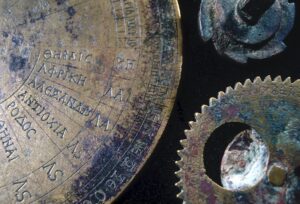
Byzantine sundial-calendar, 400–600 AD, featuring a list of latitudes for use in 16 different locations. From the Science Museum exhibition Ancient Greeks: Science and Wisdom © Science Museum Group
This, D’Angour shows, applies both to the materiality of life, as well as to its social structures and constituent foundations. He picks out the tension between Aristotle and Socrates as regards the perfect societal model, and in so doing disrupts, in many ways, stereotypes of perception regarding the Greeks and their political vision. Socrates’ koinobion, harking back, as it does, to earlier societies of co-ownership and grassroots family or social relations (itself perhaps not so much a phatic assertion, as a supreme Socratic irony on the state of our humanity) is inadequate and unsatisfactory for Aristotle, who values plurality and diversity, complex dynamics and multiple agencies above all else. His own innovative political paradigm was equally against commune-style alternatives or totalitarian states where individuality is quashed and erased, as it is against atomistic individualism, where there is no fibre of belonging or reciprocity. In Aristotle’s testament, the Greeks emerge as radical innovators when it came to thinking about a truly human society, about the very notion of statehood and community, reforming an older world around them where might was more than often proclaimed to be right, where stratifications were seen as being divinely ordained, where the worth of a life could be commensurate to its value as labour or as war fodder. Their own paradigm, imperfect, experimental, a work in progress, undeniably flawed in many ways, depended nonetheless on relationality, “reciprocity of duties”, “rotation” of roles, benefits and agency. On real civic education and a culture of the soul and of mind. They called this ethical innovation psychagogia. If anything, they thought about political theory both rigorously and creatively, as critical of themselves as they were keen observers of the attempts and proposals of those before them or by their side.
The critical mind, the sense of a public duty to analyse in order to truly understand, is another innovation of the Greeks we sometimes tend to leave uncredited, and one that D’Angour, for his part, has long placed centre stage.”
Even if the new is desirable, or in fact necessary, can it exist without the old? In his earlier book, D’Angour argues that “novelty builds on the past, whether by repeating and adapting it or by criticising and rejecting it. In practice, innovation generally proceeds according to well-tried principles: proven methods are applied to new ends, novel techniques are devised to satisfy existing requirements, differentiating elements are added to pre-existing structures, familiar ingredients are recombined to create something new. Whether the impetus is competition, necessity or individual initiative, innovation demands the productive interaction of the old and the new.” The binary relation between new and old is not an exclusive or function, but an and function, in a constant, complex, inexhaustible and regenerative dialectics. The Greeks were keenly aware of the tragic irony and hubris inherent in eradicating the old in the manner of Oedipus’ dismissal of the sphynx, and of his own and the city’s past. Oedipus had relied on the power of another innovation, lateral thinking, or absolute logic. His answer was as much right as it was wrong, in that it ignored the attachments, strings and Ariadne’s threads of all human existence. The indomitable clarity of his ratiocination was, as Tiresias reminds him with inexorable staccato-like emphasis, his totalising blindness.
The Greeks’ keenness to innovate was inextricably linked with a compulsion to reflect, to consider, to properly appraise potential benefits and dire consequences, the positive or disastrous effects on a humanity they deemed vital and essential. They were their own sharpest critics of their present and past, perhaps uniquely sensitive to the voices of others (The Trojan Women or the Iliad, Thucydides’ History come readily to mind), unfailingly open to the encounter with both darkness and shadows on the stage, through philosophy or literature, in the conversations and actions of everyday life. The critical mind, the eudaemon bios, the sense of a public duty to analyse in order to truly understand, is another innovation of the Greeks we sometimes tend to leave uncredited, and one that D’Angour, for his part, has long placed centre stage.
“One may look to the past to observe something new, one may await the future for something to be old. […] ‘With the passage of time, the old becomes new’ runs a verse attributed to the comedian Nikostratos,” writes D’Angour. And by choosing to write not one but two books on the Greeks and the new, and therefore about both the oldness of our own novelty, but also the timeless innovation of that past, he seems to be asking one further, crucial question: what does it mean to be seeking, as we appear to be doing today, a state of newness and innovation that is eugenically virginal, almost synonymous to autocreation? It is an open question, requiring a genuinely innovative answer. An answer that, one suspects, may need to consider the story and the history of our human journey, now, then, here, everywhere.
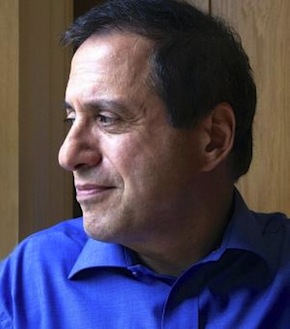 Armand D’Angour is an Associate Professor of Classics at Oxford and Fellow and Tutor at Jesus College, Oxford. He is the author of The Art of Swimming, The Greeks and The New (winner of the Spectator Book of the Year 2011, shortlisted for the Runciman Award 2012), and Socrates in Love: The Making of a Philosopher. How to Innovate is published by Princeton University Press.
Armand D’Angour is an Associate Professor of Classics at Oxford and Fellow and Tutor at Jesus College, Oxford. He is the author of The Art of Swimming, The Greeks and The New (winner of the Spectator Book of the Year 2011, shortlisted for the Runciman Award 2012), and Socrates in Love: The Making of a Philosopher. How to Innovate is published by Princeton University Press.
Read more
armand-dangour.com
@ArmandDAngour
@PrincetonUPress
Mika Provata-Carlone is an independent scholar, translator, editor and illustrator, and a contributing editor to Bookanista. She has a doctorate from Princeton University and lives and works in London.
bookanista.com/author/mika/

